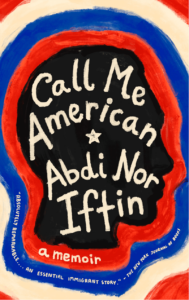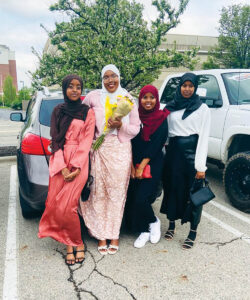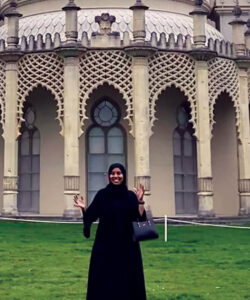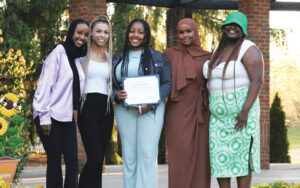Sharing Culture, Finding Community At Otterbein
 This year’s Common Book is the story of a Somali immigrant and his experience of becoming and being an American. In Call Me American by Abdi Nor Iftin, the author chronicles his love for all things American, his life in Somalia laid waste by war, the perils of leaving Africa and his immigration to the United States.
This year’s Common Book is the story of a Somali immigrant and his experience of becoming and being an American. In Call Me American by Abdi Nor Iftin, the author chronicles his love for all things American, his life in Somalia laid waste by war, the perils of leaving Africa and his immigration to the United States.
Otterbein has a thriving and growing immigrant population on campus taking leadership positions within the student community. Here, in their own words, are their experiences.
Hanan Hussein
Junior, Biochemistry and Molecular Biology and Public Health majors (Pre-Med), Psychology minor

Why did you choose to come to Otterbein and major in your chosen field?
I am pre-med track and that is why I major in BMB. Otterbein was a perfect choice because of the small, focused education environment compared to public school setting.
What do you like best about Otterbein?
The class sizes are small which means focused education. The campus feels like a family because everyone knows everyone.
What leadership positions do you hold on campus? Why did you seek leadership positions?
I am the president of the Muslim Student Association (MSA). When I came to Otterbein, MSA, was not an active organization because there were not many Muslim students on campus. It was hard for the people that were on campus to find each other and connect to renew MSA.
I took it upon myself that I would work hard to find a way and work with other Muslim students to work and make MSA an organization. I managed to get a proposal and pitched what MSA was for and about and after years, MSA was once again an active organization.
I loved the sense of bringing the Muslim community back together and giving them as well as myself a sense of belonging on Otterbein’s campus because I am also a Muslim student that needed that faith-centered organization. So while I did it for everyone I also did it for me. And that is what we stand for, speaking for the minority and those that don’t speak up, because not everyone knows how to speak to or when to speak up.
What is your favorite place on campus?
My favorite space on campus is without a doubt the Masjid (a Muslim place of worship), despite that physical location and the space. We are currently working on getting a new space in the Science Center so that is exciting. But regardless where the Masjid is located it will always be my favorite place on campus.
Describe briefly your Otterbein experience so far.
For the past two years, Otterbein has been the best experience that I have had. Dr. Masterson’s FYS class was the best. And many other professors make my education experience rich. I am also so excited to be working with Dr. Bennett and in her research lab and grateful for the opportunity.
Where are you and your family originally from? What nationality are you?
I lived in the US for about six years. I lived my whole life in Saudi Arabia, so did my mother and coming here was merely for educational purposes. Both my parents are Somali but raised in Saudi as well.
Did you experience hardship(s) growing up and in coming to the U.S.? If so can describe your journey and some of the hardships?
I had a wonderful life growing up in Saudi Arabia. The hardship was when my mother left to the US so she can file for me and my siblings to also travel to the US. The process alone took three years and I was only ten. Nonetheless I had to look after my siblings and support them as the process was taking a while.
Traveling here was also a hurdle. My mother had to meet us in the airport so we took a plane with my siblings (the youngest was 4 at the time). My sister was sick my brothers were also tired and the flight was 18 hours. I was the soldier looking after them. We traveled with a relative but I never depended on anyone else to look after my siblings. Settling in the US was not a hardship, it is easy to be foreign in another country when you have always been a foreigner. But jokes aside, I always felt I shared so much with everyone I met no matter the background or religion.
What do you like best about being in the United States?
I love the people that became part of my life: my friends, campus community, the opportunity to help others in every way I can. Whether I am an EMT and dealing with patients, or MSA president and helping new students to feel they belong in a private university, or just being a student and helping my friends.
What do you miss most about your original homeland?
I miss publicly hearing the adhan (the call to worship that is recited by muezzin prescribed times of the day). I also miss speaking Arabic all the time.
Kunkaron Adawe
Senior, Public Health Education and Global Studies majors, Psychology minor

Why did you choose to come to Otterbein?
I chose to come to Otterbein University because along with all the amazing opportunities, it has the best Public Health Education major with an amazing advisor (Dr. Braun).
Can you tell us your nationality, a little about your birthplace and journey to the United States?
I am Somali American. I was born in capital of Somalia (Mogadishu).
My journey to the United States was a significant turning point in my life. Arriving at the age of 12, I faced numerous challenges as I adapted to a new culture and language. Learning English was particularly tough, and I struggled to fit in at first. However, compared to my father, who had experienced even greater hardships, I recognized that I was relatively fortunate.
Can you tell us about your father’s hardships?
My father, a true survivor, had experienced the hardships of war-torn Somalia as a child. His stories of resilience and sacrifice served as a constant reminder of how far we had come. It was his unwavering support and hard work that paved the way for our family’s journey to the U.S.. I highly recognize and respect him for it.
Despite having vivid memories of Somalia due to leaving as a baby (4 yrs old), I still held onto the dream of a peaceful homeland. The ongoing prayers for Somalia’s recovery were not just from myself but also for my father, who had seen the worst of it.
Although my memories of Somalia are limited, what I miss most about my original homeland is the idea of a peaceful and stable Somalia. My father’s stories of a harmonious past, before the turmoil, painted a picture of a place with a rich cultural heritage and close-knit communities.
I hold onto the hope that, one day, Somalia will see peace and prosperity return. It’s a hope not just for myself but for all those who have endured this hardship. Many immigrants, like us, carry a heavy burden of trauma from their past experiences, and the dream of a peaceful homeland is a common thread that unites us in our new lives in the United States.
What do you appreciate about living in the United States?
What I appreciate most about being in the United States is the abundance of opportunities it offers. Despite the initial challenges, this country provided me with access to education and a chance to build a better future. It’s a place where hard work and dedication can lead to success, and I’ve seen my father embody that spirit.
I also value the diversity and freedom in the U.S. I’ve had the privilege to learn from people of various backgrounds, and this exposure has broadened my horizons. While there are undoubtedly challenges here, the sense of possibility and the chance to create a brighter future are what I cherish the most.
What do you appreciate most about Otterbein?
There are many aspects of Otterbein that I deeply appreciate, and some of these stand out, such as its vibrant and diverse community. This diversity not only enriches the overall experience but also opens up new horizons, including the exciting prospect of studying abroad: in which I had the opportunity to participate in. Additionally, Otterbein offers an extensive range of majors and minors, which allows students to explore their interests thoroughly. What I find particularly admirable is how Otterbein actively supports students in discovering their true passions.
Have you held any leadership positions here?
During my time on campus, I had the privilege of holding several significant leadership positions. These roles not only enriched my college experience but also allowed me to contribute to the community. Two years ago, a group of dedicated Muslim students and I sought to revive the Muslim Student Association. I served as the President of the Muslim Student Association. We took on the responsibility of providing a welcoming and inclusive environment for Muslim students on campus. We organized various cultural and educational events, which not only helped in promoting understanding and tolerance but also created a strong sense of unity among our members. I am also the current Vice President of Etta Sigma Gamma; which is a Public Health Honorary organization.
Ikra Koriyow
Junior, Political Science and Communication majors, Legal Studies minor

Why did you choose to attend Otterbein?
I visited Otterbein twice during high school, but did not really consider going there for college until my senior year. Otterbein is close to home which I have always loved as well as the scholarships offered to me has helped my family and I from financial burdens.
I also chose Otterbein because I always saw myself going to a small campus and Otterbein is just its own little community.
What do you like best about Otterbein?
What I like the best about Otterbein is the courses I have taken. I believe they have molded me into being a well rounded person and student. As well as the connections I have made here, I have made lifelong friendships and relationships here at Otterbein.
What leadership opportunities do you avail yourself of?
I am the Vice President of The Black Student Union.
Can you tell us about your background and nationality?
My mother grew up in a small village in Jijiga, Ethiopia. I was born in Nairobi, Kenya. My family’s Nationality is Somali, going down generations. I will say I had a culturally diverse upbringing, adhering to my family’s customs while still being able to learn and grow through experiences beyond Somali culture.
